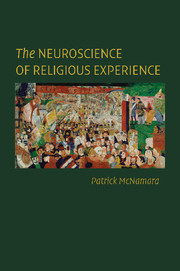Book contents
- Frontmatter
- Contents
- Preface
- Acknowledgments
- 1 God and the Self
- 2 On the Self and the Divided Self
- 3 Mechanisms and Dynamics of Decentering
- 4 Neurology of the Self
- 5 Neurology of Religious Experiences
- 6 Neurochemistry of Religiosity
- 7 Self-Transformation as a Key Function of Performance of Religious Practices
- 8 Self-Transformation through Spirit Possession
- 9 God Concepts
- 10 Religious Language
- 11 Ritual
- 12 Life-Span Development of Religiosity and the Self
- 13 The Evolution of Self and Religion
- References
- Index
9 - God Concepts
Published online by Cambridge University Press: 30 October 2009
- Frontmatter
- Contents
- Preface
- Acknowledgments
- 1 God and the Self
- 2 On the Self and the Divided Self
- 3 Mechanisms and Dynamics of Decentering
- 4 Neurology of the Self
- 5 Neurology of Religious Experiences
- 6 Neurochemistry of Religiosity
- 7 Self-Transformation as a Key Function of Performance of Religious Practices
- 8 Self-Transformation through Spirit Possession
- 9 God Concepts
- 10 Religious Language
- 11 Ritual
- 12 Life-Span Development of Religiosity and the Self
- 13 The Evolution of Self and Religion
- References
- Index
Summary
Oh Lord, you are not only that than which a greater cannot be conceived, but you are also greater than what can be conceived.
– Anselm in Proslogion XVIntroduction
No account of the neurocognition of religious experience would be complete without some account of religious cognition. Central to religious cognition are concepts of supernatural agents and God.
As always, I bracket the issue of the metaphysical status of gods or God. For now I am simply trying to clarify how concepts representing supernatural agents function in the cognitive economy of the Mind. I begin therefore with a summary review of the origins and functions of God concepts.
Origins, Nature, and Functions of “God concepts”
God concepts are concepts about supernatural agents. Supernatural agents are often (although not invariably) beings with Minds like ours but no bodies. Most often the Minds of supernatural agents are more powerful than ours. When there is a high God who rules over lesser spiritual entities in the supernatural realm, this high God often has a mind so powerful that He or She can know virtually everything one is thinking or doing. A high God who is also a “full strategic access agent” knows everything you have ever thought or done or everything you will ever do or think. These “full strategic access agents” again point to the intimate relationships that exist between religion-related matters and the Self.
- Type
- Chapter
- Information
- The Neuroscience of Religious Experience , pp. 193 - 205Publisher: Cambridge University PressPrint publication year: 2009



